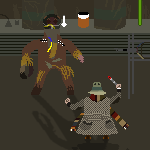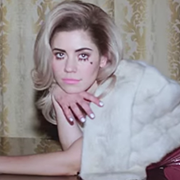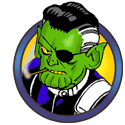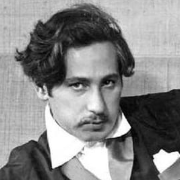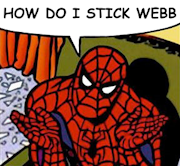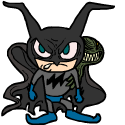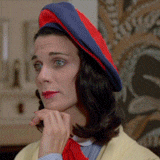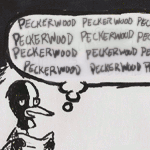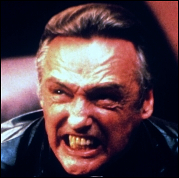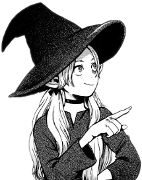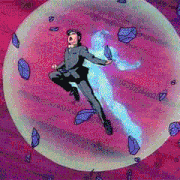|
The Walrus posted:ceiling fans own unless you're a tall person prone to extravagant hand gestures You're not concerned about fan death?
|
|
|
|

|
| # ? May 15, 2024 02:33 |
|
Ginette Reno posted:You're not concerned about fan death? I said a tall person
|
|
|
|
The Walrus posted:I said a tall person Tiny folk do not escape fan death.
|
|
|
|
Volte posted:I don't think anyone thinks that Sarah is literally Judy, only that Judy has inhabited her in much the same way that Bob inhabited Leland. The Palmer house is clearly some kind of nexus for dark spirits, so it makes sense that all of the inhabitants would be tormented and used by them. The fact that Leland is the killer was always kind of a red herring, since the real killer (Bob) was revealed in a dream in the second episode. Pretty much. I think Sarah is largely separate from Judy as an entity, just as Leland is still somehow separate from BOB. Maybe Judy only truly started to take hold after she escaped from the box. It really seems like Sarah is still struggling throughout season three (even going so far as to warn that girl at the store), and only fully succumbs when she kills the "truck you" guy. quote:https://www.youtube.com/watch?v=guwl1w0yFGk&t=20s The hum also occurs during that dream sequence when the arm is rubbing his hands, Laura taps her nose and an owl passes by. I gotta say, I'm still not sure what it's supposed to be. Are you implying it's MIKE's presence? We see him in lots of places where the hum isn't heard at all.
|
|
|
|
The Walrus posted:ceiling fans own unless you're a tall person prone to extravagant hand gestures It has the worst fanbase though
|
|
|
|
Kaworu have you ever been in a convenience store? How did it make you feel?
|
|
|
|
...Why is there an international pilot that has bob found and killed?
|
|
|
|
And More posted:Pretty much. I think Sarah is largely separate from Judy as an entity, just as Leland is still somehow separate from BOB. Maybe Judy only truly started to take hold after she escaped from the box. It really seems like Sarah is still struggling throughout season three (even going so far as to warn that girl at the store), and only fully succumbs when she kills the "truck you" guy. Perhaps it has something to do with alcohol. Assumedly at the grocery store she had gone longer than would be typical without a drink, as she was picking up more. And the violence really truly came out at the bar. Might at least be some symbolic representation of the contributions alcohol can make to cycles of abuse and trauma. maybe a reach,
|
|
|
|
And More posted:The hum also occurs during that dream sequence when the arm is rubbing his hands, Laura taps her nose and an owl passes by. I gotta say, I'm still not sure what it's supposed to be. Are you implying it's MIKE's presence? We see him in lots of places where the hum isn't heard at all.
|
|
|
|
And More posted:I think the show couldn't be more explicit about it without directly telling us. I totally forgot about that line, but I'll gladly fold the grey thing that shows up twice into the Judy/Sarah/Jowdah cosmology, in spite of the problematic elements. quote:When Hawk is asked what the mother symbol means he says: "You don't ever want to know about that." Understanding Judy means losing yourself. Look what happened to Phillip Jeffries. When Cooper finally arrives in Twin Peaks, he straight up ignores Bobby when he asks for an explanation. Knowing about Judy endangers you, and therefore it cannot be said aloud anymore. But these two elements I semi-reject. While I'm in the Judy/Jiao dai rabbit hole myself, it's a metatextual element. I think the evidence of some sort of linkage between the two is pretty solid, but I could see some discarding all readings that hinge upon it. That said, the danger of knowledge runs rampant throughout the show, but characters generally succumb to their lack of knowledge rather than a complete knowledge. Jeffries and Coop both get in deeper than they can manage, Leland breaks down the moment that he is forced to acknowledge Bob, Briggs winds up disembodied. I see many of those elements as pertaining to loving around with the unknown, an echo of the issue of knowledge rather than about knowledge itself. Mr. C's "Who is Judy?," to me, is still riffing on those echoes, but I'm afraid of rephrasing it in order to understand it. He isn't certain what Judy is, anymore than we have clear evidence what Judy's plans for him are, or his for her. All we can go on is his behavior as a Lodge Spirit and the endless Boborbs inside of him. But then I start saying things like that and I realize how easy it is to lose the track when thinking about Lynch's work this season. In ways, the esoteric and often funny elements are required to produce a holistic take--if this show lends itself to a holistic take. I think any meaning is derived from the experience, instead of necessarily crafted from the top down. The Merkinman posted:Showing the original series to a friend of my girlfriend and picturing Sarah as the Big Bad doesn't really work. Why would she be upset if Laura were dead since Laura could "defeat" Judy? This is a definite issue, though I'm stopping short of calling it a "problem" like I wanted to. "Judy" was a loose end from Fire Walk With Me and I understand Lynch's urge to play around with it. Same time, I don't think the ways he played around with build to an intelligible whole. To bring up Jeffries' place in that, what we have to go on are the lines already mentioned, the desk clerk referring to a "young woman," and the friendly monkey whom we all adore and wish to have as a pet as we sit beneath our ceiling fans. It's evident that the "Judy" in that film was a character left on the cutting room floor of that film, and what Lynch builds out of it is something entirely different that doesn't quite connect. But this is a season/series of things that don't quite connect, with a series of trap doors that prevent a simplified theory of how it functions. Like the ax through the TV, or the couple that summons Mother/Judy (see? y'all roped me in) thru sex as Sarah watches the lion feast, Lynch is disrupting the experience of viewing television in its standard style. I don't think anyone would dispute that--though I don't think I've seen anyone touch on the metaphorical value of a couple getting killed for loving while the box bored them coming from the man who gets the jitters about people viewing cinema on their phones. Why cookie Rocket posted:The big issue with that reading is that somehow Sarah is ultimately responsible for what Leland did because Judy birthed Bob. I'm not down with that for a number of obvious reasons I can unpack if anyone really doesn't see it. This is the part of the reading I have the most issue with, I admit. It's fully wrong to place the blame on her, but something about this series, the nightdriving shots especially, kept me in the mood of Lost Highway more than Lynch's other work. Pure linear causality doesn't work--I enjoyed the "Judy trap" ending interpretation, for instance, though I don't quite subscribe to it--so I think it's valuable to let one's mind wander in thinking about all the pieces that drift within the murk. I don't think, though, that this makes Sarah responsible for the behavior of Bob/Leland anymore than any mother is responsible for the atrocities their child may commit. Sarah learned something horrible and became, from it, something horrible, much as Laura's identity continually splintered because of the life she endured. The Laura that dies in FWWM is no longer the pure golden orb that the Fireman sent to earth in Episode 8 because a corrupt existence corrupted her; the Black Lodge wanted to dismantle her and, until the final moment of her rejecting Bob and accepting death, they seemed to succeed. Purpose strays and dilutes and, just as in the reality, people go through horrid experiences and can become, themselves, monsters for it. I'd hazard to say that it doesn't speak purely to the real world, without divulging too much, but the Palmer household specifically and Twin Peaks generally are a host to things that become their shadow selves and rarely, if ever, recover. I've also always felt that Sarah was somewhat complicit in her being drugged simply because she did not want to know what was happening to Laura; not out of cruelty, but out of her own powerlessness to stop it, to intervene in any way. Judy only enters the TP metaphysics once she can no longer escape that knowledge, no matter how much she wants the genie back in the bottle--or the Silent Hill trashmob back in the box, or nuclear power back in the Ramayana. The revelation broke her, and now she harbors within her something wretched and vile, even if it is antagonistic to the things it births. Hell, gently caress "even if." She is antagonistic to the things she births; she wants to eradicate the entirety of her experience, and Sarah and Leland and Bob are all part of that experience. So, to me, these things echo repeatedly through the shows. Leland is a victim of trauma as a child, becoming/birthing Bob on a metaphorical level; Sarah is a victim of trauma as an adult, becoming/birthing Judy on a metaphorical level--and in the process revising her own life, the history she experienced, by viewing it through a new lens. They're people being ridden by things, but those things are not otherworldly and unintelligible; they're shadows of the well-recorded behaviors of our species. I'm not into "entities" being used to describe these, as I feel that reduces them to something tangible that can be grappled with rather than existing on the plane of intuition that reaches back through humanity's brutal and bleak lineage. The moment Bob becomes an orb, a Brit with a funny glove can destroy him. The moment Judy is fully understood to us, as viewers, the work is dead and can no longer be engaged with for anything except superficial elements, and we begin trying to figure out why the waiting room set changed between seasons, or why Leo is fat in FWWM but skinny the next day in the show. My own sidenote: was rewatching the end of Season 2 the other day, and that really doesn't sound like Earle's voice coming from Sarah when she meets with Briggs at the RR, regardless of what closed captioning says. One of the most interesting things about Lynch's work with this is his willingness to continually revise what came before, even though the past, being already filmed, is set in stone. I think that speaks to several elements within the newest season, but it seems like this thread--and the discourse of the larger communities--have a good grasp on that. I also appreciate how he rolls with the punches, handling what was brought into Season 2 in his absence, engaging directly with the loss of certain actors, or even just letting editing flubs dictate. His intuition is sharp, even if there are instances--like, largely, Judy and her place in the cosmology--that seem to break our understandings by their inclusions. quote="The Walrus" post="476748672"] Perhaps it has something to do with alcohol. Assumedly at the grocery store she had gone longer than would be typical without a drink, as she was picking up more. And the violence really truly came out at the bar. Might at least be some symbolic representation of the contributions alcohol can make to cycles of abuse and trauma. maybe a reach, [/quote] I don't think that's a reach. Echoes how cocaine, or magiccocaine, have been used through the series. i promise ill never write a post this long again Gambit from the X-Men fucked around with this message at 17:23 on Sep 25, 2017 |
|
|
|
Gambit from the X-Men posted:Judy/Sarah/Jowdah cosmology, Yes sir, one order of 'Joudaire' ed: good post 
|
|
|
|
The Walrus posted:ceiling fans own unless you're a tall person prone to extravagant hand gestures I have been a victim of this before. I also narrowly avoided having an improperly installed ceiling fan drop on me one summer, so being short doesn't exclude you from danger. The ceiling fan is the caged tiger of household appliances, gentle and giving until it decides to maul you.
|
|
|
|
Krinkle posted:...Why is there an international pilot that has bob found and killed? The budget for the pilot was contingent on him making a complete movie version that they could sell overseas in the event the show wasn't picked up. The international "pilot" is really just that movie version.
|
|
|
|
Gambit from the X-Men posted:But these two elements I semi-reject. While I'm in the Judy/Jiao dai rabbit hole myself, it's a metatextual element. I think the evidence of some sort of linkage between the two is pretty solid, but I could see some discarding all readings that hinge upon it. That said, the danger of knowledge runs rampant throughout the show, but characters generally succumb to their lack of knowledge rather than a complete knowledge. Jeffries and Coop both get in deeper than they can manage, Leland breaks down the moment that he is forced to acknowledge Bob, Briggs winds up disembodied. I see many of those elements as pertaining to loving around with the unknown, an echo of the issue of knowledge rather than about knowledge itself. Seems reasonable to think of Judy as something like "the terror of knowing what this world is about" rather than simply "knowing". In that sense, Laura's scream would be the central symbol for someone being horrified at their own knowledge. Both Hawk and Margaret actually know what Judy is, after all. They just don't let the knowledge overwhelm them: quote:Remember what I told you. I can't say more over the phone. But you know what I mean, from our talks, when we were able to speak face to face. Watch for that one, the one I told you about, the one under the moon on Blue Pine Mountain.  While there probably isn't a satisfactorily straightforward answer, there are definitely a lot of elements that make me think that Judy is a properly constructed metatextual device that's also part of the proper narrative level. A lot of knowledge is hidden from the viewer, even though the characters in the scene know what's going on. Characters constantly make references to things they talk about, which we haven't seen. There is the whole Chad storyline, of which we apparently only witness the tail end. The Blue Rose case, Briggs, Cooper and Cole's plan, and even the little vignettes at the Roadhouse with all their random one-off characters. I think Mr. C's plan and Judy's plan fall into that category. At other times, the characters themselves are confused, leading to the many iterations of "What the hell?" and "What is going on?", even when we have a fairly clear idea of what's going on. My favourite conversation at the Roadhouse is the one in which both women seem to know a person called zebra, and it's like a little joke they share. Then, the one woman brings up a person called penguin, and the other one doesn't know what her friend is talking about. quote:W1: You know that zebra's out again? You don't know who they're talking about, but neither do they. It's metatextual because it riffs on the show being fictional and constructed, but it's also still part of the narrative. quote:i promise ill never write a post this long again You may think I've gone insane, but I promise I will post again.
|
|
|
|
Every couple days I am reminded or just remember some little moment or character or scene from the new season that I forgot about. It's already got so much staying power and I'm looking forward to rewatching it in the next year or so. I like this show name of "New Season of the Show Twin Peaks"
|
|
|
|
I went back to the finale and I think this is my take on it: It's Richard's dream like the guy in the diner in Mulholland Drive. Judy isn't "Joday, which became Judy", it's just Judy. Cole says that in Richard's dream as a way to shield him from the fact that Judy's is a real place in the real world, mystifying it. There is no "Joday". Judy is just the mundane, depressing place that alive Laura ends up in, a lovely life as a waitress in some lowlife restaurant. She's still "a woman in trouble" and always will be because of her powerlessness and status as an object for the men she meets. Richard's unconscious censors this. He is just an average FBI agent, not a hero, people around him live boring, unfulfilling lives and so does he. The final moments is when she realizes that the world she is in is just another fantasy, instead of her father's it's Richard's and the viewers' fantasy this time, imagining that he can save her like some princess in a videogame. The house's lights turning off is exactly like dirty faced woman in Mulholland Drive, dream spilling over into reality, or rather, realizing that that which you feared in your dream is something that haunts you in reality, that the good moments in your dream are just illusions and means of escape. Laura is not real, she's a fictional character in more ways than one, she's an object of projected fantasies, when she realizes this she simply vanishes as the show ends and the universe disappears.
|
|
|
|
Shibawanko posted:I went back to the finale and I think this is my take on it: If the universe is the show, and the end of the show signals the end of the universe, then how can there be a credits sequence? I think the credits indicate that the dream continues. We see Cooper (as Cooper) react three times to Laura's whispering. The first time, he seems surprised. The second time he is confused. The third time he switches twice from looking sad to horrified. I think it's the sad realisation, that the plan is futile, that there simply is no end in sight. The suffering repeats forever. Also, I don't know in what world you live that an average, ageing FBI agent takes out three armed cowboys on his own. Diane confuses Cooper for Richard, but he is actually still Cooper. Just without the usual niceties.
|
|
|
|
Laura screams at the realization that Audrey's and Sarah's storylines were unfinished. She wanted to know what happened! 
|
|
|
|
Shibawanko posted:I went back to the finale and I think this is my take on it: I got mixed up on this too when I was putting together a theory but the Jowday, which became Judy conversation happens at the very beginning of episode 17. it doesnt take place in Richard's dream.
|
|
|
|
I had the chance to try a green tea latte today. Frank's smile flashed through my mind. https://www.youtube.com/watch?v=gnHAFNu91iI It was pretty good.
|
|
|
|
Every loving time this gets posted I immediately hear Black Hole Sun.
|
|
|
|
Shibawanko posted:I went back to the finale and I think this is my take on it: I like this but it doesn't take into account that there's another shot after that, of Laura whispering into Cooper's ear. I know that's an image of a previous scene, but that still runs against the main ending telling us that "she simply vanishes as the show ends and the universe disappears".
|
|
|
|
At the end of this long, strange trip, I find myself longing for a simpler time of murdered teenagers and dancing dwarves.
|
|
|
|
This is probably old news, but I binged season 3 over the past week and I knew the tulpas transforming back into golden beads reminded me of something. https://www.youtube.com/watch?v=2uDsVi2EU_E
|
|
|
|
Years ago in college, I read this literary criticism book called The Passion of David Lynch: Wild At Heart in Hollywood that gave various feminist interpretations of Lynch's work that I found pretty interesting. Probably the most compelling insight was that Cooper's heroic qualities largely come from his passive receptivity and intuition, traits that are often coded as feminine (compare to famous detectives like Sherlock Holmes and Hercule Poirot). The thing that's pretty funny is that in an essay about FWWM, the author interpreted the mysterious whisper of "Judy" as being something like--In the dark, small world of Laura's abusive household and her nightmarish life, we get this mysterious woman's name, Judy. It comes out of nowhere and doesn't seem to refer to anyone in the story. So mentioning this mysterious "Judy" is like a portal or a finger pointing to a door that leads to someplace new, someplace less stifling. In a sense, the fact that there's someone named Judy of whom we know nothing about is like a shot at redemption. So as far as I can recall, the author interpreted "Judy" as this positive, generative sign that implied that there was hope to be found somewhere in the world. Which is just really ironic.
|
|
|
|
kaworu posted:Can you guys PLEASE stop talking about creepy ceiling fans? I read this entire post thinking to myself "who the hell is scared of a ceiling fan" then I checked the username and it all made sense.
|
|
|
|
This may explain why Showtime Anytime sucked so badly compared to watching on Amazon: https://gizmodo.com/showtimes-websites-may-have-used-your-cpu-to-mine-crypt-1818763497
|
|
|
|
chime_on posted:This may explain why Showtime Anytime sucked so badly compared to watching on Amazon: I was watching Showtime through Sling and would have issues pretty often too. I wonder if this carried over to Sling or not. Generally I've had a lot of issues watching anything on Showtime through Sling. It gets hung up all the time. I want to cancel it bad, but I'm also trying to rewatch Season 3. I guess I better move fast.
|
|
|
|
Huh, didn't see any issues while using the AppleTV (gen 3, so fairly stupid) app. May be one of the few times I've appreciated that locked down, hanky little box.
|
|
|
|
Cephas posted:So mentioning this mysterious "Judy" is like a portal or a finger pointing to a door that leads to someplace new, someplace less stifling. In a sense, the fact that there's someone named Judy of whom we know nothing about is like a shot at redemption. So as far as I can recall, the author interpreted "Judy" as this positive, generative sign that implied that there was hope to be found somewhere in the world. Well, from another angle, it's interesting that the only person who calls Judy negative is the male federal authority figure known for his lustful ways. Perhaps to Gordon Cole, someplace less stifling and more generative/radically redeeming IS an extreme negative force to his worldview. Lynch has never shied away from letting protagonists be wrong about things...
|
|
|
|
chime_on posted:This may explain why Showtime Anytime sucked so badly compared to watching on Amazon: hahahahahaha what
|
|
|
|
oh cool, my copy of Twin Peaks ost on vinyl came in hey, what's this?   oh... a print of the cover signed by angelo badalamenti...  ... word..
|
|
|
|
TheBizzness posted:I read this entire post thinking to myself "who the hell is scared of a ceiling fan" then I checked the username and it all made sense. Don't you have something better to do? Do you honestly think I'm *really scared of ceiling fans" or just having fun with it because I've never lived in a house or an apartment with ceiling fans before and the discussion in the thread was all about the creepy ceiling fan and that crazy scene from Missing Pieces And yeah I do find ceilings fans *just a little bit creepy* at the moment - loving make fun of me all you want. After I watched Ringu for the first time late at night I had a hard time sleeping because of all the screens in my bedroom that now seemed like yawning portals of evil or something  It's just me complementing Lynch for taking a normal household object and imbuing it with so much... menace, and terror. What truly frightens me about the ceiling fan stuff in Twin Peaks is that the menace and terror of it is rooted in that feeling of powerlessness as a child - Laura Palmer, lying in her room. and hearing it click on making that slow and steady inexorable sound, and she knows exactly what it means. And yeah, I can't think about this stuff without getting upset and crying because I just can't. This is the emotional reality of the show that grounds all the supernatural elements and gives it a concrete emotional resonance and reality. I always thought that's what the Fireman meant by "It is in our house now" and "it cannot be said aloud now". Those two lines apply so specifically to thousands upon thousands of domestic abuse situations that it's scary.
|
|
|
|
if you don't think ceiling fans have any real world harm, watch this *walks to a whiteboard with "CEILING FANS" written on it* *writes "GLASS" in front*
|
|
|
|
https://www.youtube.com/watch?v=7wVVkCJpY4U
|
|
|
|
Last night, I dreamed that Cooper returned Laura to James and Donna. They were still young like in the original series, but Laura's face was all blue like she was slowly suffocating. I remember being very impressed with the acting because she genuinely looked like she was going to keel over from lack of oxygen, and her speech was so strained. Then it dawned on me that this was a deleted scene, and that it explained how Laura could still be alive. Anyway, I'm glad Lynch got to direct my dream. Also, I just got done watching all of Audrey's scenes again. They are terribly confusing. I don't know what's going on there. Why does Audrey say the same thing as the Arm about the girl down the lane? Why are they talking about dwelling on the threshold? I thought that was a doppelganger thing. What's up with the contract and ending her story? And why does Audrey suddenly snap out of it when she asks Charlie to get her out? Wasn't he trying to keep her in? Are they in the parallel dimension? Is that why Audrey doesn't recognise Charlie anymore? And More fucked around with this message at 10:13 on Sep 27, 2017 |
|
|
|
There is not enough information to decode anything about Audrey's story so its futile even trying.
|
|
|
|
Origami Dali posted:oh cool, my copy of Twin Peaks ost on vinyl came in Cool. Now send it to me.
|
|
|
|
Alan_Shore posted:There is not enough information to decode anything about Audrey's story so its futile even trying. It seems like there are more than enough parallels between Audrey's scenes and the rest of the show to find some meaning in it. I just don't know how to make heads or tails of it. There are the "Where is Billy" scenes, and there is the whole "dreams sometimes hearken a truth" aspect. Audrey, Gordon and Jim Belushi have these prophetic dreams.
|
|
|
|

|
| # ? May 15, 2024 02:33 |
|
And More posted:Last night, I dreamed that Cooper returned Laura to James and Donna. They were still young like in the original series, but Laura's face was all blue like she was slowly suffocating. I remember being very impressed with the acting because she genuinely looked like she was going to keel over from lack of oxygen, and her speech was so strained. Then it dawned on me that this was a deleted scene, and that it explained how Laura could still be alive. That's an awesome dream to have, And More. I really miss having, like, random dreams about various things. I still get them on VERY rare occasions and I did have some Twin Peaks once this summer that were great but I totalluy forgot them, and only just remembered that I had them in the first place now. Very very rarely do I dream in vignettes, when I recall having my dreams it always feels like days/weeks have passed over the course of the dream. I dream kinda oddly I think in that regard. My dreams have fely like a consistent alternate reality of some sort with physical locations that have been entirely consistent for... like, at least 4 or 5 years now. The main parts are a massive theater the size of a stadium able to do special effects in the air with floating sheets of shimmering water, which seems to be located in a sort of massive.... amusement park, for lack of a better word (though that's not quite what it is). It's located near the base of a mountain, which also features in my dreams, as well as a nearby town that is a version of Boulder, CO. There is another big city I sometimes take a long bus or plane flight too which is reminiscent of both Boston and Florence/Venice. And there is also a summer camp with a nearby logging facility that is only accessible by canal. These are all consistent locations that my dreams are always set in... I often wonder whether other people have dreams with semi-defined geography? Um, anyway, bringing things back to Twin Peaks, I need some help... I am a bit of a Twin Peaks 'superfan' or something, but besides a Dale Cooper Funko doll something gave me, I don't exactly have much "Twin Peaks stuff". I had a DVD set maybe 15 years ago from when I first watched the show (the blue-ish cool one) but that's long gone, as is the bare-bones FWWM DVD I bought in a bargain bin once, lost in one move or another. It just hasn't really felt all that urgent to collect the series since it's all there for streaming, and at the moment I don't even really even use or watch my blu-rays except under rare circumstances since virtually everyone can be found streaming between Ammazon/Netflix/Hulu. All that said... I'd kind like to own "The Entire Mystery" if I can hunt down a copy that costs less than $100. Which might be difficult. Well, I'm honestly just really hoping they release some super limited edition collection of seasons 1-3 plus FWWM + Missing Pieves plus every single extra and documentary produced. And I'd have to buy the criterion of FWWM which I'm doing anyway, o'course.
|
|
|






